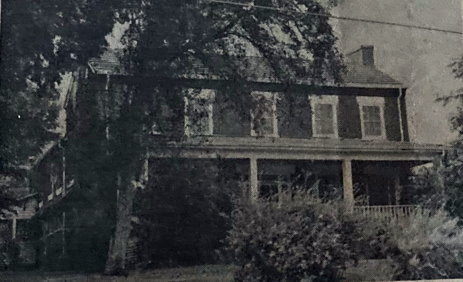Mourfield Tavern on Kingston Pike is closed. By all accounts, it was a delightful place to visit and the proprietor was a jovial man known as “Uncle Billy” Mourfield. Unfortunately, his tavern was shuttered from loss of business as a result of the construction of the East Tennessee & Georgia Railroad in 1853.
That is right! The Mourfield Tavern was built circa 1800 and was located in the vicinity of Kingston Pike across from the entrance of what is now Seven Oaks subdivision in the city of Knoxville.
We are indebted to William D. Peters, local writer and historian, who wrote a series of articles in 1894 titled “An Historic Highway” for the Knoxville Journal. It was Mr. Peters’ desire to preserve certain historic facts and traditions of this area that he hoped would be of “sufficient interest as to command general attention.” It is ironic today to compare his reports with those of today where that we find our local businesses still being closed due to situations that directly affect their trade.
Peters told of the effects of building Kingston Pike when in 1792, Knox County commissioned Charles McClung to locate a public highway to be built from Knoxville to the Campbell Station Inn which was in the western end of Knox County. The highway followed an Indian trail that was used by pioneers to travel from James White’s fort. With the making of the new 30-foot-wide road, the trip that usually took 4-5 hours was shortened to 2-3 hours which substantially improved progress in the development of what would soon become the Concord/Farragut community.
Peters’ description of Uncle Billy is worth quoting, “He was an ideal Boniface, so the story goes, hospitable in the highest degree and kept a table that was the wonder and admiration of his guests. No lesser a personage than Gen. Andrew Jackson once dined with him, and that alone gave his house most enviable distinction.”
The innovation of the railroad brought the Concord/Farragut community great wealth and by 1887, Concord was the second largest community in Knox County and was a regional transportation center that ferried both passengers and commercial traffic, transporting goods such as marble, limestone, farm produce and livestock. The postal area included land from the western Knox County line to the Bluegrass Community which is now annexed by the city of Knoxville.
The given name of “Uncle Billy” remains uncertain and was most likely one of several William Mourfields that lived in the area during that time. It is possible that he was an early family member of Dr. James Ashley Mourfield (1855-1938) who held practice at Concord and is buried at Concord Masonic Cemetery.
From Mr. Peters, we learn that the tavern was purchased by George W. Prater who made it his family home and it was passed on to his son, Tracy W. Prater. The Praters have been long upstanding citizens of the community and were active in the Cedar Springs church and area. An interesting side note is that Tracy Prater married Elizabeth “Lizzie” Walters, the sister of U.S. Sen. Herbert S. “Hub” Walters from Tennessee.
Mona Isbell Smith is a retired computer systems analyst who enjoys freelancing.

